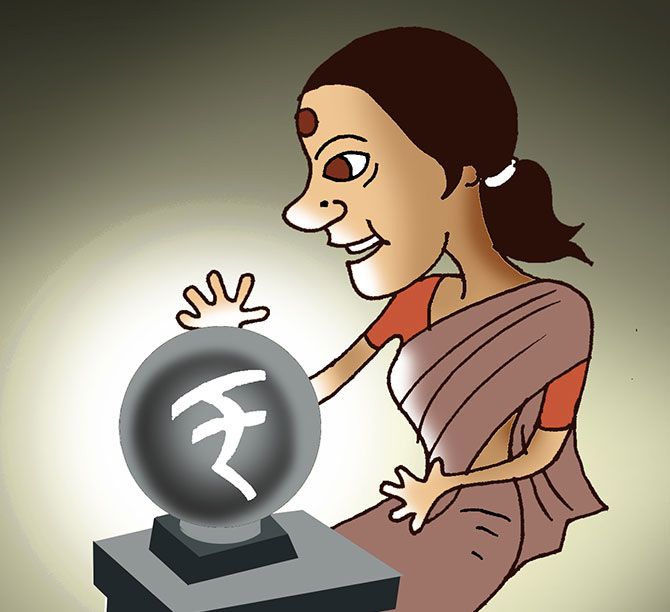'Given the emerging trends, it may be time for India to embrace digital banking,' notes Pradipta Bagchi.
Illustration: Dominic Xavier/Rediff.com

The year ends with the reputation of banks and non-banking financial companies in tatters.
Even the Reserve Bank of India's cast iron image has been dented.
Rocked by crisis, from blatant mismanagement (in Jet Airways) to large-scale fraud (PMC Bank, DHFL) and outright capital destruction (Yes Bank, IndiaBulls), the sector has struggled to save its reputation.
Once again, the banks shot themselves in the foot, unsuccessfully fighting the Securities and Exchange Board of India for ownership rights to shares pledged fraudulently by Karvy -- thereby, continuing to build a public narrative that banks were ever ready to be irresponsible -- be it at the taxpayer's expense, the depositors' or retail investors'.
From being perceived as economic victims weighed down by bad loans, the finance sector has emerged as the villain in 2019.
Bad decisions aside, 2020 will see new reputational dangers for the sector.
While fintech has resulted in some meaningful breakthroughs and disruptions, for instance, new peer-to-peer standards like Unified Payments Interface have transformed digital payments.
But fintech heroes come with a set of villains -- such as the new breed of fintech lenders.
These startups are thriving on delivering loans to customers, mainly millennials who are starting out in life with little or no credit histories and an appetite for loans.
New types of loans, such as short-term (a day to a week) advance payments before salaries (payday lending) or similar bridge loans, are released without personal guarantees, collateral and even the due diligence of a credit score.
Instead what these fintech lenders do is build a profile and 'trust' score based on analysing your personal data, which they demand as a pre-condition for loan approval.
Once they receive full access to your digital life, they analyse the data on your phone -- SMSes, mails, photos, contact list and then apply artificial intelligence and machine learning tools to create a customer profile.
Based on this 'trust score', it is determined how much can be lent, at what cost and for what period.
For their customers, giving access to personal data and privacy concerns are a good trade-off to access loans, which otherwise they cannot access.
This type of lending is growing fast with enormous margins (think rates higher than credit card debt).
Many such firms are not just lending directly but licensing their technology to commercial banks and non-banking financial companies, for whom fintech allows them to lower their know your customer costs to determine creditworthiness.
Search for fintech lending, and many success stories pop up.
Tales of quick loans that paid for important life events or averted personal disasters abound.
But search deeper, and there are equally harrowing tales of social embarrassment and familial stress when these loans turn sour.
Operating outside banking industry safeguards, fintech lenders can go after errant customers using the only weapon they have -- social embarrassment.
By harassing a borrower's parents and other family members and ruining social reputations with people they may work with, fintech lenders' collection methods resemble an old 20th century model -- that of credit card bill collectors introduced by American banks in India in the 1990s.
In contrast to the banks in the country that are shrinking in size and number due to consolidation and bankruptcies, the digital financial needs of our aspiring 1.3 billion are only growing rapidly.
Many of the troubles stem from a patchwork approach, which tries to fuse a digital economy with a cash-driven one as well as manage the parallel co-existence of 20th century brick-and-mortar banks with 21st century fintech start-ups.
Creating a regulatory umbrella could help a new breed of digital-only banks to take root instead of dangerous fintech bubbles that can further erode the trust in the financial system.
From the UK to South Korea, digital-only or virtual banks are making a big impression with lower lending rates, transaction costs as well as greater ease of use.
Singapore is set to auction its first digital bank licences.
Although regulations have been benign for foreign banks with digital-only operations here, the RBI's plate is too full of troubles of existing players to worry about new type of banks.
However, given the emerging trends, it may be time for India to embrace digital banking holistically.
Given the rapid growth in fintech lending and, therefore, the potential scope for abuse, the government must use this opportunity to jump-start the next phase of banking evolution and help renew customer confidence.
Fintech, when done well, has been the biggest success story for Digital India: UPI has become the global benchmark in digital payments in such a short time.
Recovering one's reputation often involves reimagination and reinvention.
It is time to push the banking sector to that new digital frontier.
Pradipta Bagchi is a communications professional.











